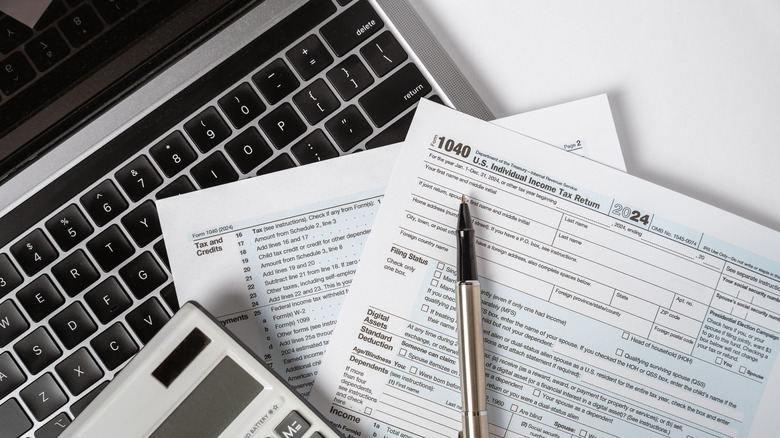You've Been Warned: Throwing These 5 Financial Documents Away Could Cost You
We may receive a commission on purchases made from links.
You will get a special kind of relief when you finally sort through your drawer(s) one weekend and toss out old bills. But beware, throwing away some important financial papers can come back to haunt you, and leave you open to an IRS audit for not submitting some forms (because you lost them). Losing vital documents could also get insurance claims denied, and could get families tangled in legal disputes down the road. Kiplinger warns that even messy paperwork can force families to shell out thousands in legal fees or sit through lengthy court delays. But incomplete or lost paperwork might cost you assets or leave benefits unclaimed.
At this point, you should have a safe way to store your tax returns and other vital files. If you don't, consider SentrySafe fireproof and waterproof safe with key lock or the Amazon Basics fire resistant security safe with electronic keypad. If what you worry about is becoming a document hoarder, only keep the essentials like your property titles, wills, trust receipts, life insurance policy paperwork, signed tax returns, and estate planning documents (like powers of attorney and healthcare directives). To avoid finding out what happens when you get audited by the IRS, do not throw those five financial documents away.
Tax returns and supporting receipts
Discarding tax documents too soon can cause problems later — especially if you face an IRS audit or apply for a loan. In those moments, you'll need proof to back up your claims. If you can't produce the right paperwork, you could see your loan denied or even face steep penalties. According to proven guidelines, keep every signed tax return you file; the IRS recommends holding onto these forms forever. Years down the road, that original 1040 could be your only shield if the IRS questions your reported income. And it's not just about taxes. Those signed returns also support mortgage applications, student-aid requests, and Social Security benefits.
Also, keep your W-2s, 1099s, deduction slips, and expense records for at least three years — this is the standard IRS audit window. If you claim big losses, like bad debts or worthless securities, hold on to them for up to seven years. These papers prove your deductions during an audit. If you toss them too soon, you could end up owing back taxes or penalties if the IRS questions your filings. Without those records, you lose your best evidence for income verification or audit defense. Don't shred the originals, instead, scan them into encrypted digital storage. Alternatively, box up the paper copies and clearly label each by tax year.
Home purchase & improvement records
Letting go of your homeownership papers can lead to a big tax hit when you sell, This is why you need keep everything that proves your home's "adjusted basis" forever, starting with your purchase contract and closing statement (HUD-1/Settlement Statement). IRS Publication 523 states clearly that these documents can help you figure out capital gains taxes when you want to sell. In other words, the consequences of losing them is you could miss out on subtracting your actual costs and end up with a much larger tax bill than you expected.
Keep every receipt for major home improvements — whether it's a new roof, an HVAC install, a renovation, an addition, or significant landscaping. Without those receipts, the IRS won't count those improvements, forcing it to base your gain on the original purchase price. That can turn what should help you save into an unexpected tax bill. To be ready for any IRS review tied to your sale, stash all purchase documents and improvement receipts safely until at least three years after the tax year you sell.
Retirement account records
Tossing out your retirement plan statements could leave you or your heirs stuck paying taxes twice on the same dollars. Avoid this by hanging onto every IRA, 401(k), and pension statement until all the benefits have been paid out and the IRS audit window has closed. The IRS advises that you need to keep these records until the plan finishes paying and any audit period — usually three to seven years after you file the final return for the account — has passed. That way, you'll have the paperwork you need to prove you've already paid what you owe.
Forms 5498 and 8606 are vital in proving your tax status; Form 5498 shows any contributions you made to traditional or Roth IRAs, while Form 8606 tracks non-deductible contributions and Roth conversions. Keep these forms so that when you need to, you can prove which dollars have already been taxed. You will also avoid paying taxes twice when you withdraw funds.
Hold on to your annual retirement statements to smooth out or prevent issues when your beneficiaries need to claim inherited accounts or when you must take Required Minimum Distributions (RMDs). These statements give beneficiaries a clear proof of ownership and confirm that RMDs were taken correctly. Without them, heirs could face delays in receiving assets, or you might trigger penalties or an audit if your records are missing.
Mortgage payoff & loan documents
When you lose your mortgage papers, it can block future sales, complicate refinancing, or trigger needless fees if liens aren't fully cleared. This is why you need to retain your key documents even after you've sold the home. Bankrate advises you to keep the original mortgage note, the deed of trust (or mortgage), and the payoff letter that confirms your debt is paid in full. It doesn't matter how long you owned the property; the papers prove the loan was legally satisfied.
The paid-in-full payoff letter, which goes alongside a formal lien release or reconveyance, is what says the lender holds no claim to your home. If you lose these papers, it makes it look like a lien still exists, and this can disturb a sale or refinance in years to come. In fact, losing your original promissory note makes you vulnerable. If that happens, you'll likely have to file an affidavit of loss, pay court or recording fees, and get a certified replacement note before a title company or new lender will clear the title or approve a refinance.
Similarly, if you don't have a recorded payoff statement showing your lender has released its claim, title companies won't close on your sale, and lenders won't refinance. You'll need certified lien release paperwork, which often means paying expedited processing costs and legal filing fees — easily running into the low hundreds — and waiting weeks for everything to be sorted.
Insurance policies documents
Keeping your insurance paperwork safe and up to date is crucial for protecting your family and recovering losses after a disaster. Beneficiaries need the original policy to file a life insurance claim, and misplacing it could mean missing out on a six-figure death benefit. Note that not throwing these away can also ensure your loved ones can claim assets and cover any damage when they need them most.
After a fire, flood, or accident, your homeowners and auto policies are the lifeline that proves you had coverage. Insurance companies won't process claims without seeing your policy details, which means you could be left footing the bill when you're already at your most vulnerable. On top of that, the IRS counts insurance paperwork as essential proof when you claim casualty-loss deductions; un-reimbursed storm damage or business-related write-offs. Tossing out these documents risks losing out on valuable tax savings.
On a final note, keep yourself secure, tuck active policies into a fireproof, waterproof box, and scan them for an encrypted backup. Each year, glance through your receipts and let beneficiaries or executors know exactly where to find these critical papers, so everyone is prepared when emergencies strike.





